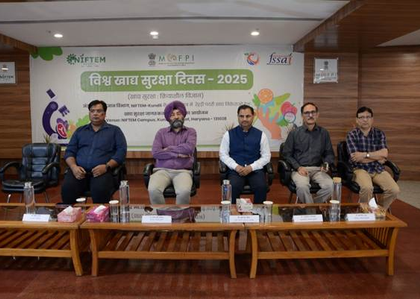NIFTEM-K focuses on street vendors to boost food safety drive
By IANS | Updated: June 8, 2025 19:03 IST2025-06-08T18:59:59+5:302025-06-08T19:03:28+5:30
New Delhi, June 8 The National Institute of Food Technology Entrepreneurship and Management, Kundli (NIFTEM-K), an Institute of ...

NIFTEM-K focuses on street vendors to boost food safety drive
New Delhi, June 8 The National Institute of Food Technology Entrepreneurship and Management, Kundli (NIFTEM-K), an Institute of National Importance under the Ministry of Food Processing Industries, concluded a meaningful two-day observance of World Food Safety Day 2025 over the week-end with a series of impactful initiatives aimed at strengthening food safety awareness and promoting scientific engagements.
Themed “Food Safety: Science in Action,” the events showcased the NIFTEM-K’s commitment to ensuring a safer food ecosystem through grassroots outreach and expert dialogue.
In collaboration with the Food Safety and Standards Authority of India (FSSAI), the NIFTEM-K organised a comprehensive food safety awareness workshop for over 100 street food vendors and small business operators from Delhi NCR and Sonipat.
Led by the Department of Interdisciplinary Science of the NIFTEM-K, the workshop educated participants on critical food hygiene practices, including the importance of personal hygiene and sanitation, protecting food from flies, rodents, etc, and adhering to safe food handling procedures.
Vendors were also informed about the necessity of obtaining proper licenses and adhering to statutory requirements to ensure the legality and credibility of their food businesses.
A highlight of the workshop was a live demonstration of rapid adulteration testing kits developed by the NIFTEM-K for milk and milk products, spices, and tea. At the conclusion, participating vendors were awarded certificates for their participation in the programme, reinforcing their role in upholding food safety standards and boosting consumer confidence.
Dr. Harinder Singh Oberoi, Director NIFTEM-K, emphasised the very prominent role of food vendors in public health and highlighted their responsibility in delivering safe and clean food to the public. He noted that food safety begins at the grassroots and encouraged participants to adopt best practices in their daily operations.
Mukul Gupta, National Resource Person (FoSTaC), facilitated interactive training sessions covering a broad spectrum of food safety topics, starting from basics of hand washing, use of portable water, SOPs for washing utensils, basic pest control measures and rationale behind refrigerated storage.
On June 7, the NIFTEM-K hosted a thought-provoking webinar focused on the critical role of science in food safety. In his welcome address, Dr Oberoi asserted that science must extend beyond the laboratory and become an integral part of public health policy and everyday practice. He stressed the urgency of proactive food safety measures, cautioning that the next public health crisis might be a silent, foodborne epidemic.
He also advocated for the inclusion of food safety principles in school curricula and proposed the development of stainless steel food carts, low-cost rapid testing kits, and enhanced research on foodborne pathogens and contaminants.
Dr. Iddya Karunasagar, Advisor, NITTE University, Bengaluru, discussed the essential components of risk analysis—assessment, management, and communication—and emphasised that testing alone cannot ensure food safety, unless supported by good practices across the food chain.
Dr. Rajan Sharma, Joint Director (Research), ICAR-NDRI, Karnal, presented rapid detection kits for milk and milk product safety developed at NDRI and also emphasised the importance of food safety, especially in perishable commodities like milk and milk products.
Rakesh Kumar, Deputy Director, Tea Board, spoke on the safety concerns in tea processing, highlighting how contaminants can enter during production stages and commended the NIFTEM-K’s role in developing detection kits for pesticides and artificial colours in tea.
Disclaimer: This post has been auto-published from an agency feed without any modifications to the text and has not been reviewed by an editor
Open in app